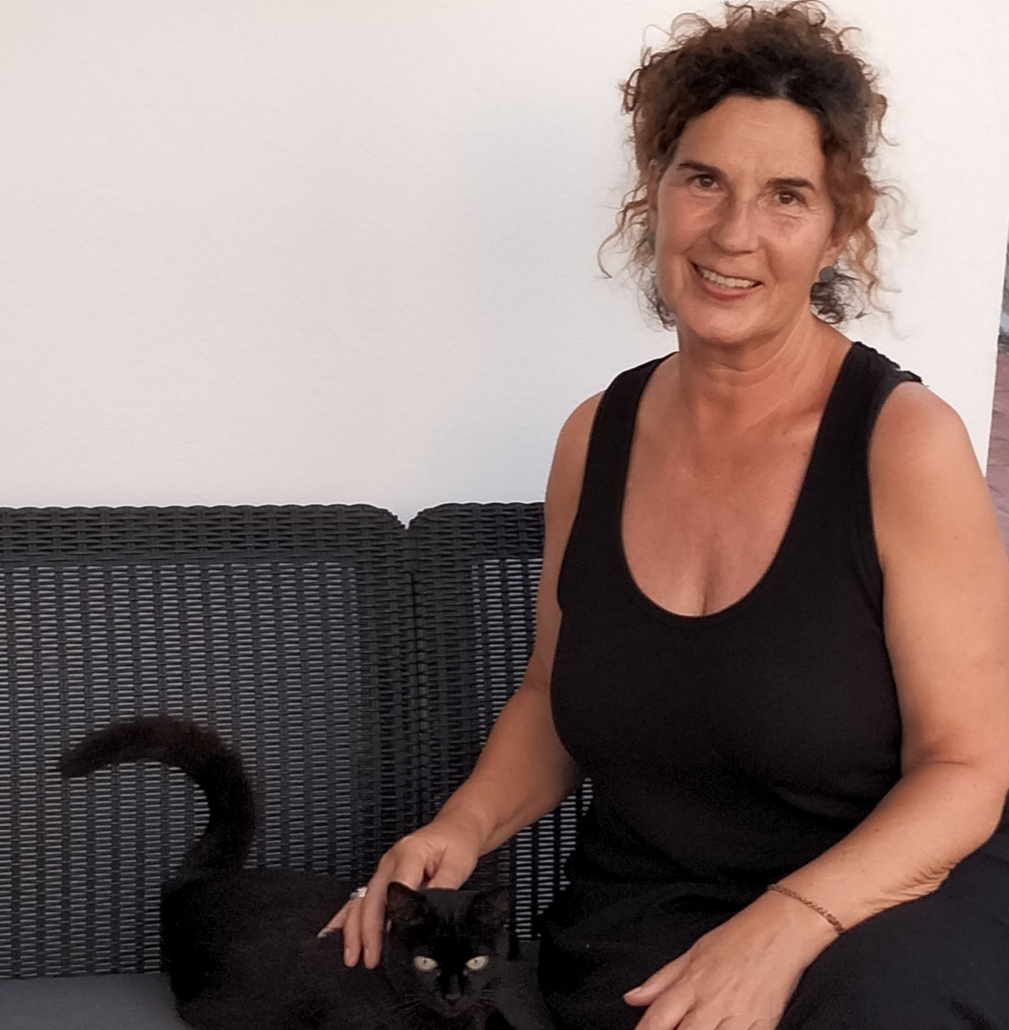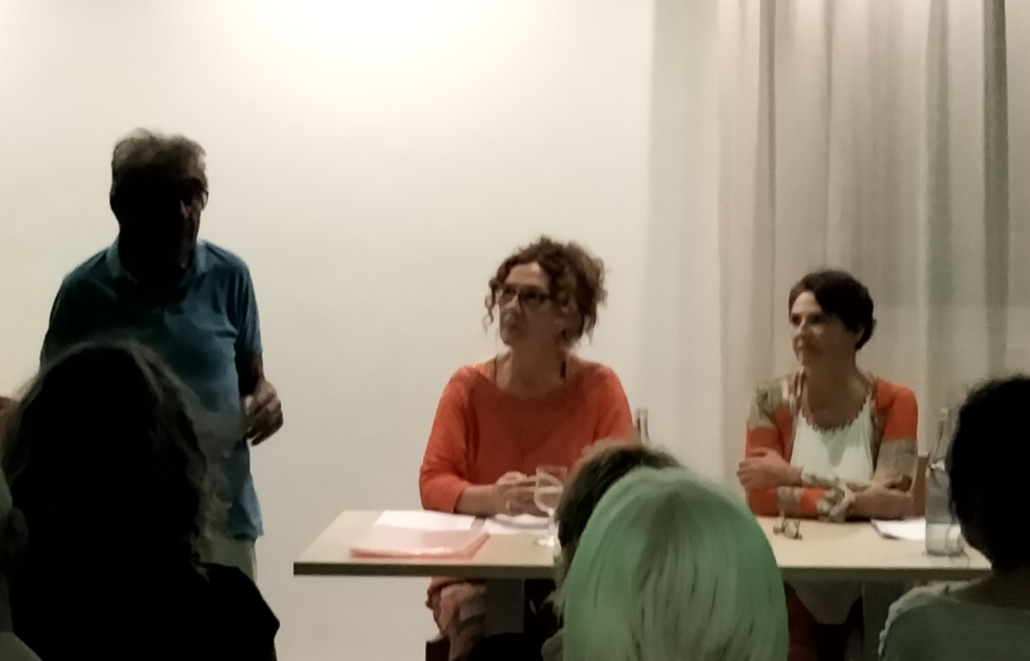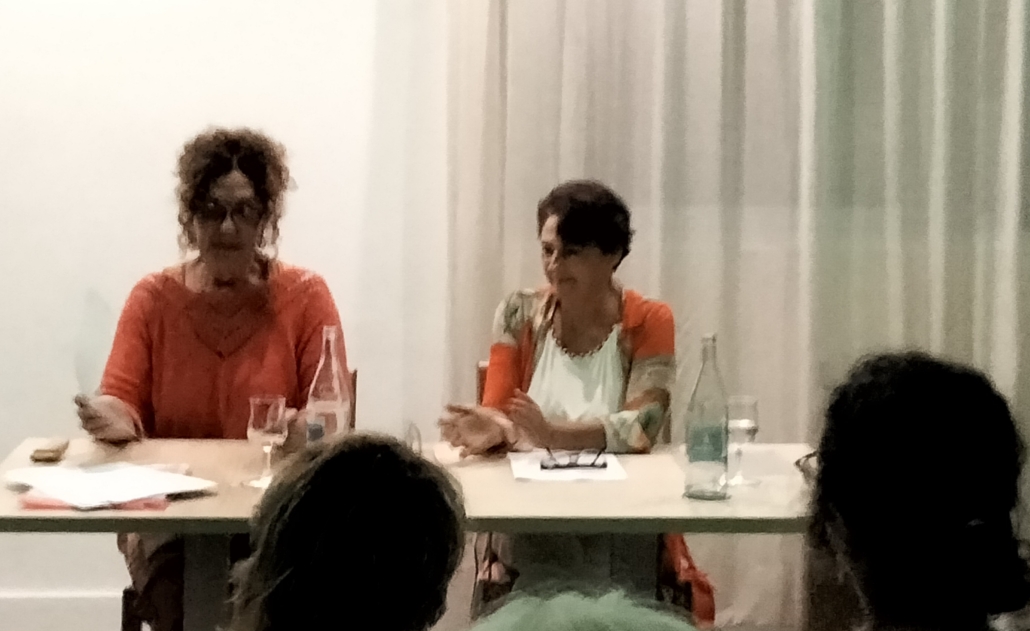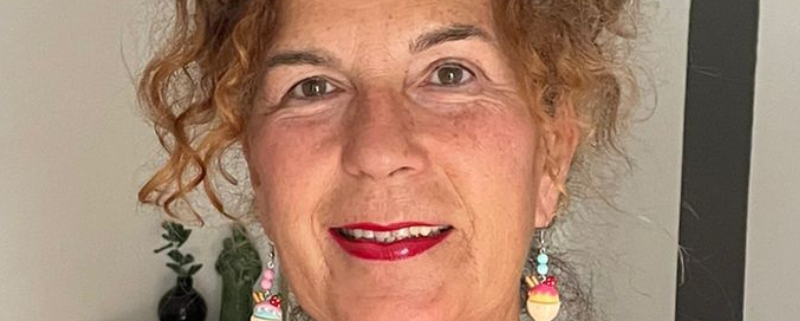STRIPPING THE WORDS BARE
STRIPPING THE WORDS BARE
a talk by Mercedes R Minguela

We have featured Mercedes Minguela (left) on these pages several times over the last few years, and so were delighted when she recently sent us to hear the above talk, and then felt very proud when she agreed to let us have a manuscript copy of her speech to replicate in Sidetracks And Detours, in both English and in Spanish. Of course this English translation is a the framework of a talk in whcxih she extemporised and included readings of some of her works.
She spoke, delivered and recited from her heart and soul even as she introduced her fellow guests on the podium.
Her lecture and she as its author, were introduced to us by Manuel Martín-Arroyo Flores, Member of the Academy of Sciences, Engineering and Humanities of Lanzarote, and co-ordinator of this series of Autumn Literary Days, in which he had invited to participate.
He first introduced the woman siting next to Mercedes as José Fina García Laynez, a reader of the group Letras para el Alma, whom Mercedes had asked to accompany her in the reading of some of her poems to help deliver o a recital in two voices.
There was a good six audience present, most of whom were obviously familiar with her work and, of course, she is a well know figures on the island´s literary art scene
Good afternoon, thank you for being here, thank you for giving me a little bit of your life. For your time is nothing more or less than a piece of your life.
When I was invited to give this lecture about myself and my poetry, I felt very honored and I accepted with a thousand loves, then as I had to prepare the conference I began to get stage fright and I couldn’t stop asking myself: What can I tell about myself? How can I make them enjoy this time, my poetry? And I was getting more and more afraid…… Fortunately, my journalistic profession came to save me and I decided to approach this talk as an interview with myself
So don’t be surprised if I detach my life and my poetry from this format, which logically begins by situating the character.
As I consider it very complicated to explain who I am, I am going to tell you something about my life, what I do and why I do it…. You can draw the conclusion. I am a woman born in a village in Castile, in Segovia, in the bosom of a large family, who for various circumstances left very young, at the age of 15, to study away from home.
I grew up in my adolescence and youth without the constant tutelage of my parents, at first with my older sisters (I am the fifth of six, plus a brother), then living with young people from different places, mentalities and even cultures. That meant, I think, made me open-minded and able to adapt to very different environments comfortably and respectfully.
I studied journalism because I like to write, and out of altruism, I wanted to change the world, denounce the abuses and abuses of the powerful through my columns. I’ve always really liked writing, telling, narrating, telling, it excites me. During my studies at BUP and University I wrote about my emotions, about my impressions of things that happened, short stories, and some, little, very little poetry.
I worked in different small newspapers in the provinces, where I loved to write interviews, short reports and opinion articles, this was an enriching professional and vital journey. I collaborated on TV scripts, such as the series “My Favorite Crimes” directed by the then older and very famous “Lady of Crime” Margarita Landi, quite an experience for a young woman like me.
Once I completed this journalistic stage, and again in Madrid and I spent years working as Marketing Director for written press (newspapers, magazines, etc). I temporarily put aside writing, reports, interviews.
It was during that period when I discovered Yoga, I mention it because this discovery years later changed my life. I spent years juggling my stressful job in marketing while studying and practicing Yoga. Yoga was my “lifeline” both physically and emotionally in that world of marketing. A very stressful world where expressions such as the “death line” are used on a daily basis. Death Line… In spite of that hectic working life, I have to admit that during this marketing period I learned and enjoyed a lot, because it is the time of my great trips to Asia: to China and India. In the latter country I studied Yoga, Ayurveda and Meditation.
Curiously, it was that learning and especially Yoga that made Marketing come to an end, because I stopped being interested in that lifestyle and, after 20 years, I ended my stage in that world.
Six years ago I voluntarily left my job, my home in Madrid, I gave a brutal 180 degree change to my life and I currently live in Lanzarote Already here in Lanzarote since the end of 2017 I have turned to Yoga and poetry. And if someone were to ask me about how I got to poetry, or better yet, how do you get to poetry? I think that what I read recently in an interview with the poet Guido Martínez Carbonel, faithfully defines my own experience. Carbonel used to say that: “You don’t have to look for poetry, it finds you” and I feel very identified with that definition.

My most personal friends know my “possession” anecdote. I’ll tell you how poetry itself found me. It was like a possession hahahaha, although in this case and fortunately it was not “satanic”, quite the opposite, since it allowed me to begin to externalize a series of feelings, ideas, emotions, experiences that suited poetic expression like a glove of thin skin at hand
To these friends I already revealed that it was walking through Famara when poetry found me and I fell into its “clutches” hahahaha. I always say, with a bit of irony and joking, that: My first poems were like that automatic writing, that you don’t contradict them and that it is a spirit or diabolical entity that directs your hand.
Then I realized that, logically, according to me, it is more that creative process than in psychology and it is called the state of “flow” and that David Goleman described perfectly in his best seller “Emotional Intelligence” (in case you want to read it). That it is neither more nor less than a moment of perfect connection between mind and spirit or soul, as you prefer.
From this first period are the poems that I call “Poems of Famara” of which I will read the one entitled “Loca, possessed” which is a clear exponent of that process of creation and a type of somewhat obsessive theme. Famara’s poems are somewhat “naïve”, without great linguistic complications, or excesses, where I use simple words and basic literary figures such as: alliteration, simple metaphors or repetitions to create rhythm, a lot of rhythm. Although the rhyme is free, I sometimes use the assonant rhyme.
I didn’t want to retouch these poems because they are the product of what I was then and above all of the emotion of loss and helplessness that I experienced during that period (the decision to leave work and my house in Madrid was absolutely meditated and voluntary, but then things didn’t go anywhere near as I had planned (life gives you surprises, lol…… I didn’t want them to lose that spontaneity that was so important to me. It is a poetry where pain is expressed in a constant search for something, who knows what, of constant movement, inquiring, trying how to continue living even with risk and pain
I continued with that hypothetical self-interview: My first contacts with poetry were, curiously, through music, apart of course from the basics that we studied at school at the time (Machado, Juan Ramón Jiménez, Lorca and little else and never their complete biographies, hehehehe. Thanks to my older sisters, in my house I listened a lot to the singer-songwriters of the late 60s and 70s, people like Joan Manuel Serrat or Paco Ibáñez, among others, who put music to many Spanish poets, especially from the Generation of ’27 (1927) and the Generation of ’98 (1898). Rafael Alberti, Gabriel Celaya, Antonio and Manuel Machado, Luis Cernuda, Federico García Lorca, etc. As that was still a very macho world, it was not until years later that I met the women poets of that same generation of ’27 such as: Rosa Chacel, José Fina de la Torre, María Zambrano or Ernestina Champoucin and from them the Latin Americans, Alfonsina Stormi, Wlash, Gabriela Mistral, Violeta …

A second stage in my poetry continues to be impregnated with deep feelings, many of them of deep nostalgia for my “particular lost paradise”, of my chimera of love shattered, of a feeling of loneliness, real or imagined, sometimes serene solitude and sometimes of irremediable loneliness, and once again the obsessive thoughts that trap the verse. All this in poems such as:
Olvido
No dejo de pensar en ti
Palabras Ahogadas
Why do I call this lecture “Stripping the Words Bare”? I already commented in the last interview for the Biosfera TV Magazine, last September on the occasion of the presentation of the creative writing workshop of the same name, from my point of view: when the poet writes, he or she carries out a process in which the first step is to defoliate, *to bare the words, returning them to their purest state, To dress them in the “clothes, ideas, feelings and emotions” of each author, or simply to let them be.
Muy a menudo se confunde el desnudar una emoción o sentimiento con desnudar tu alma. Algunas personas me han preguntado si todo lo que escribo es lo vivido. ¿Si mis poemas expresan mi yo más profundo mas real? y mi reflexión sobre esto, mi primera respuesta seria que sí, que revelan al poeta en toda su más sublime e impúdica realidad.
Although later, if you reflect a little more, you can also see the other side: you can see that writing poetry, like any intellectual act, has a lot of voluntary, studied, worked, so I would say that the poem reveals what the poet believes it to be, with it filter his emotions and expectations and that only in sublime moments, which in psychology are called “flow states” and in spirituality it is “being in connection with the Divine or the Supreme” of which I spoke before half-jokingly, but which exist, in those moments they are completely naked. That is to say, in unfiltered states, only in those states, is it revealed who the poet really is, for better or worse. But, of course, every poem, if it is not something experienced empirically, is always something lived from “the felt” and that effectively lays bare the soul of the poet and shows it as an offering to his readers. I would like to read these two poems to you here
Momias en las cajas
Mujer
As you may have seen from the readings of the poems, my poetry is usually recreated in feelings, emotions, in the chimeras of what could have been and was not, in the trompe l’oeil of the mind, in what I imagine it was, and what it will be, in the ideas and beliefs about my way of facing them and of living this life.
Regarding the landscape theme, of descriptive enjoyment of nature, it is not usual in my poems, but I do rely on the sublime nature to sometimes frame those feelings and emotions that I want to reflect
Regarding the landscape theme, of descriptive joy of nature, it is not usual in my poems, but I do rely on sublime nature to sometimes frame those feelings and emotions that I want to reflect.
An example of poetry of nature and manners would be the following poems that I wrote specifically for the last poetry festival Vinopoesia, in which I participated in Vitoria and which will continue here in Lanzarote at the end of the month. Co-directed by Nacho Romero and Elisa Rueda.
Campesinos conejeros
Volcanes y Parras
To end the presentation, I have selected three poems, all of them with a sweet and positive outlook on life. In them, with simple similes and fresh metaphors, with games and tasks of everyday life, I wanted to express how we can de-dramatize life by supporting ourselves and using the small details, the small changes, we do not always have to face life in titanic struggle, sometimes it is enough to change small things and the effect can be extraordinary
Abalorio
Paleta de colores
Patchwork- Labor de retazos
I just want to add that from my point of view, poetry is born from reality, from life itself, at ground level. Because life itself is all poetry. As the poet and singer Horacio Guarany would say: “if the singer (the poet) is silent, life is silent, because life itself is a song….”
I hope you have enjoyed enjoyed this little talk and might seek out my poems. If you have any questions or comments, I am at your disposal.




Leave a Reply
Want to join the discussion?Feel free to contribute!